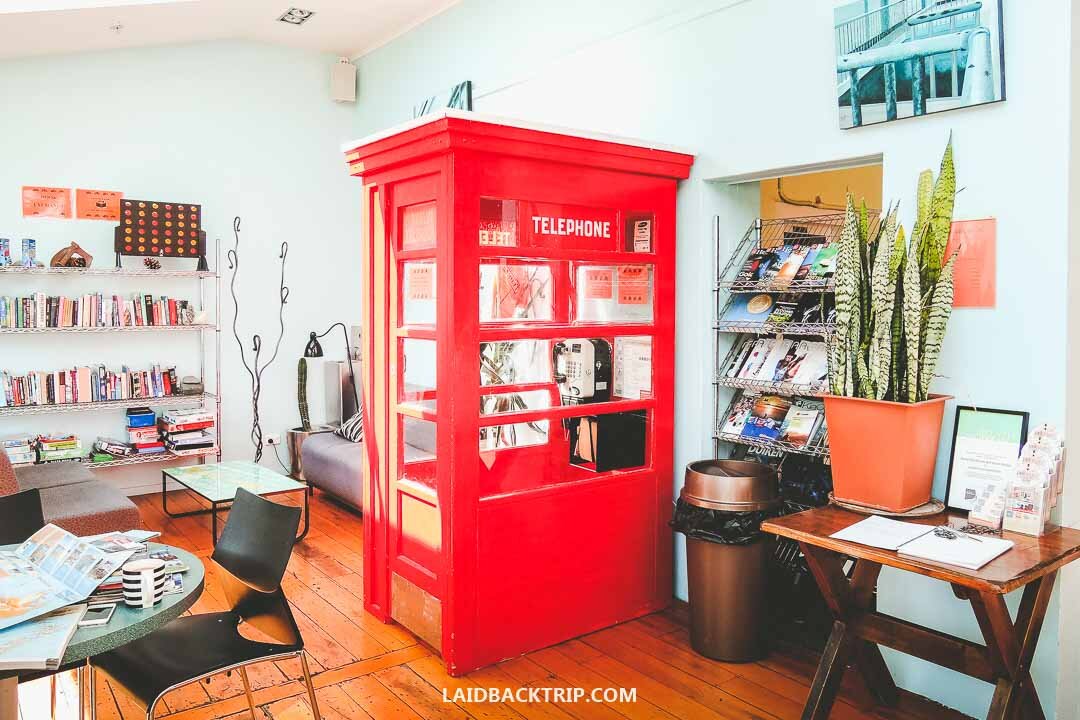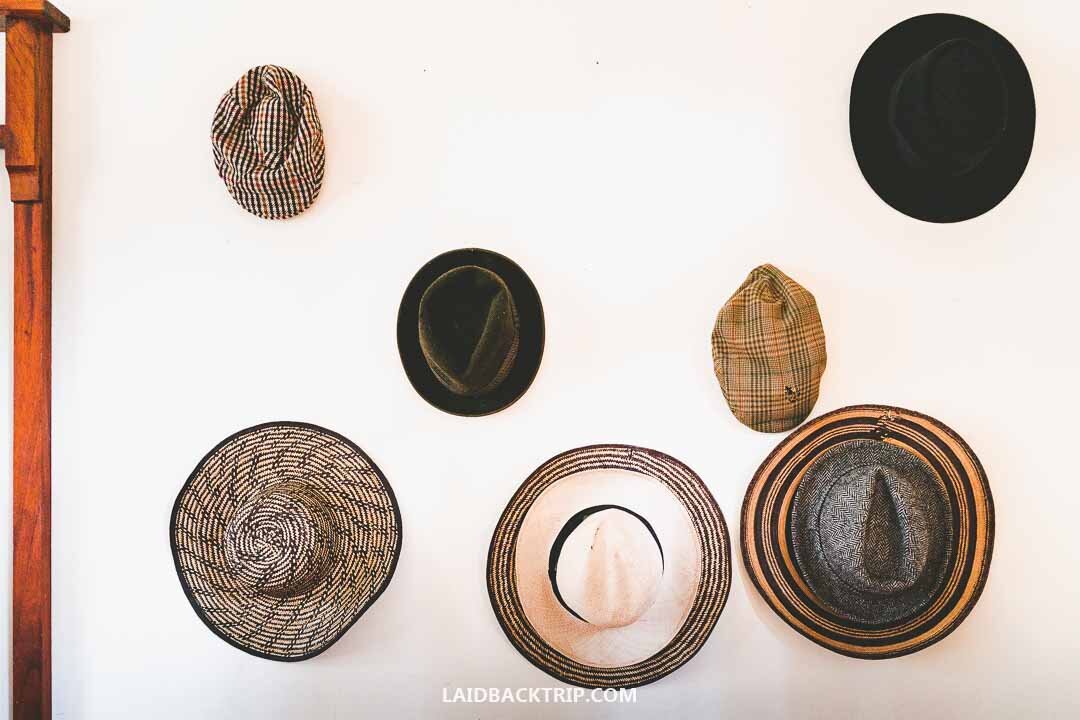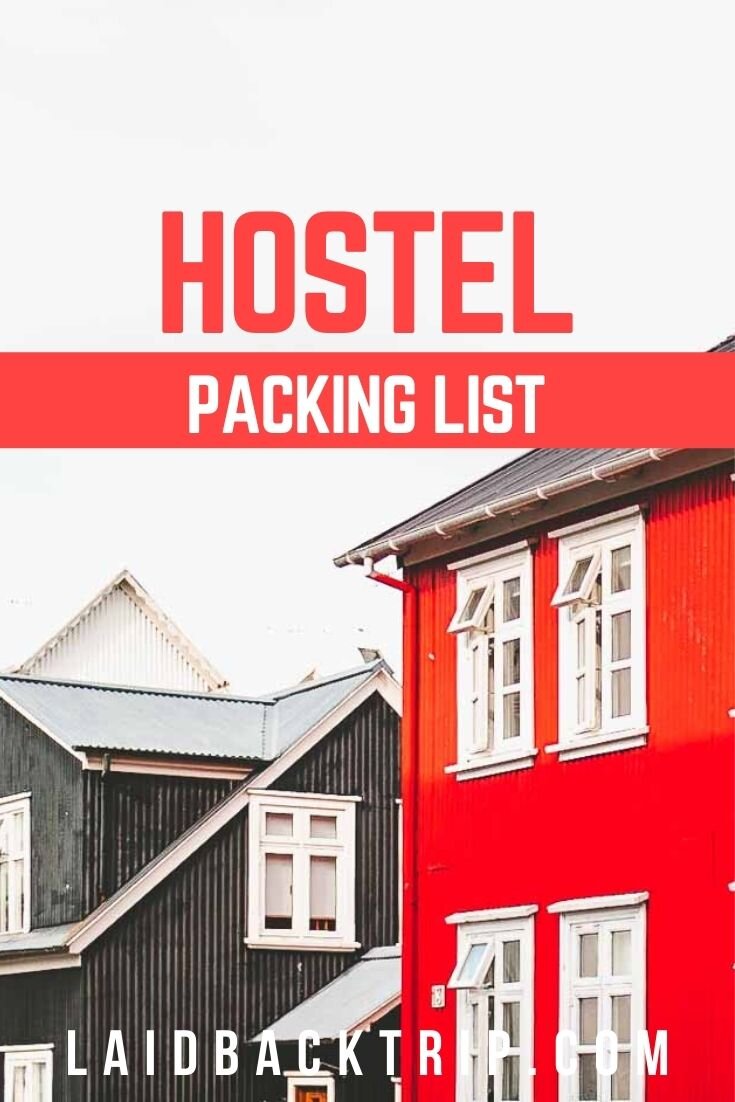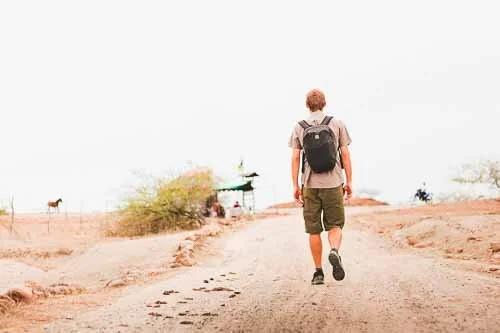The Only Hostel Packing List You'll Ever Need
A practical hostel packing list for backpackers always comes in pretty handy regardless of your destination. Our list covers all must-have travel essentials we pack while staying in a hostel, including tips on optional items and what to leave behind.
If you are new to hostel life, you might think that you don't need anything special to bring with you to this type of accommodation. Wrong.
Staying in hostels is a bit different from staying in the traditional hotel rooms that you are used to, and you might want to adjust your packing habits a bit.
Moreover, hostels often charge even for basic stuff such as clean towels or padlocks, so it's better to come prepared. Only this way can you save money as you will have everything you need, and you will avoid paying for things you needn't have to pay for.
Every hostel is a bit different and not everywhere you need the same things. As hostels are one of the cheapest accommodation you can find, their popularity is still growing. And more and more new travelers wonder what's the essential hostel packing list.
And once you know what to pack for staying in a hostel, make sure to read also our another helpful blog post on how to pick a good hostel.
We stayed in hostels in many countries all over the world, but we always bring the things we'll mention below. Furthermore, most of the items on this list will come in handy in almost every hostel in every country in the world.
And lastly, most boys and female hostel packing lists will be very similar.
So, what should you bring with you to a hostel and what to leave behind? Keep on reading.
WHAT TO BRING TO A HOSTEL
Before you go, make sure to pick the right hostel. Some hostels offer more in terms of amenities and services, while some are really basic.
Also, think of the location and the purpose of your trip. If you plan to do adventure activities in New Zealand, you will need different clothing and gear than when exploring Rio de Janeiro or visiting Prague in winter.
Also, don't be afraid to contact the hostel directly and ask them a few questions - this will help you understand the dynamics, and your packing list will be more accurate.
Here is everything you need while staying in a hostel.
BACKPACK
Before you search for a good travel backpack, it's important to realize what's your next travel destination and how long the trip is.
A year-long trip around South America will require a different backpack than a weekend trip to Dresden or a two-week journey across Malaysia.
For shorter trips, we recommend you use hand luggage only. Not only will you pack only essentials, but you also save money on checked-in luggage (that's often not included when flying low-cost).
While frontloading backpacks give you quick and easy access to your stuff, it's not a deal-breaker to get only a top-loading one (the best ones usually combine both solutions).
If you want to keep your luggage in the locker throughout the day, you might want to make sure that it will fit in the lockers (you can ask the hostel before going about the locker's dimensions).
Traditional backpacks 45-55L are fantastic for backpacking trips (hence the name), but you might also consider bringing a wheeled suitcase.
They are perfect for city breaks where you will base yourself at the hostel for the entire length of your stay.
DAYPACK
We love ultralight foldable daypacks though they are not that comfortable as traditional daypacks. They are great if you travel only with carry-on luggage, but it's good to know their pros and cons. The size and weight ratio are hard to beat for shorter trips, plus we love its pocketable feature.
When you plan on traveling with a big heavy backpack, you'd be better off with a proper daypack.
A comfortable daypack is a must-have if you plan on leaving the hostel and explore its surroundings. And you can wear it even in the hostel if there aren't any lockers, or you are worried about your valuables.
Furthermore, you can also use it as carry-on luggage; just make sure it fits the overhead compartment in the airplane to avoid paying extra fees.
PADLOCK
Keeping your things safe is essential when traveling. It's basically everything you have for the time being. Therefore, you should keep them safe.
Most of the hostels have lockers in dormitories, but not all of them provide you with a padlock. At least for free.
A good padlock is a must-have when staying in a hostel. You will save some money on rentals and ease your mind a bit as your things will be safe.
It makes sense to bring a couple of them, as you can use one for the locker and the second one for a backpack that won't fit in there.
EYE MASK
We must admit that we didn't use eye masks for a long time. But then we visited Iceland in the summer and learned that a sleep mask is vital to get some good sleep while there. But not only there. So we started using it for traveling ever since.
Even though you can experience the midnight sun only in a few hostels around the globe, they all have lights. And there is nothing worse than the light being constantly turned on and off by your roommates entering and leaving the room at night.
Lights are a common problem in every shared room, and the eye mask will make your night very pleasant.
The sleep mask is one of those things you don't want to skimp on, as the cheap ones are not comfortable, nor do they fit.
EARPLUGS
While an eye mask is helpful to have when you sleep in dormitories, earplugs present a completely different story.
Firstly, they literally weigh nothing, and they fit pretty much everywhere. Secondly, even if you are staying in a private room, the walls are often paper-thin, or there just might be a noisy party upstairs which will keep you awake for most of the night. And lastly, they are incredibly cheap, and if you get the right type, even reusable.
If you are a light sleeper, then never ever forget the earplugs. They come in handy not only when sleeping in a hostel but also on long-haul flights or bus rides.
Reusable silicone earplugs are a great alternative to regular ones.
QUICK DRY TOWEL
One one the essential things we never leave home without, a quick-dry towel, is a must-have item when staying in a hostel. Towels are often not included in the price for a room, so you should bring your own to save on rentals.
So what's a quick dry towel exactly? They are bath towels that are lightweight, very soft, and you can easily dry them in just a few hours.
Moreover, they are much smaller than regular towels. Therefore, they won't take up much space in your backpack.
When you are traveling, you will use them every day, often without a chance to expose them to direct sunlight. So their feature to become dry quickly is invaluable.
If you are going to the beach and need something to sit on, you can use them as well. Just make sure to wash them afterward, or we recommend you bring a proper lightweight beach towel.
Choose a towel with vivid color to lower the chance of leaving it in the bathroom or dormitory.
Travel towels can stay without odor longer than regular ones. However, you need to dry them every time you use them. Putting a wet towel in a plastic bag for longer periods is a big no.
TRAVEL ADAPTER
If you travel in a country with different sockets, you should bring a travel adapter to charge all your electronics. Modern backpackers bring their phones, laptops, tablets, and cameras with them to hostel these days; therefore, a universal travel adapter is a must-have (and not only for hostels).
Rule number one of all electronics when on the road is to keep them charged. Some hostels have universal wall sockets, but it's not very common.
Lastly, always check whether you will need the travel adapter or not. For example, when we travel around Europe or, obviously, when we travel locally - we usually leave the travel adapter at home.
But even some distant countries across the world can have the same sockets as you have in your home country.
FLIP FLOPS
After a long day walking around Prague's historical center or hiking in Torres del Paine, it's time to take off your shoes and slip into something a bit more comfortable.
Flip flops are light, you can attach them to your backpack if you can't tuck them in, and we use them all the time while in hostels.
Some people prefer to wear flip-flops while showering (they are great if you don't like to step on one of those rubber mats), so that's another reason to bring them with you.
Flip-flops are the epitome of hostel life, and you should never leave them behind.
While wearing flip-flops outdoors is extremely popular among backpackers in destinations such as Southeast Asia or Central America, we don't really recommend it. Walking on the sidewalks in some countries is hazardous even with sturdy shoes, so wear some lightweight runners instead.
SILK LINER
Hostels often have a reputation of dirty places, though, mostly among the people who don't stay in them.
The truth is that cleanliness is one of the top categories that all accommodations pay attention to (including cheap hostels). And you shouldn't be that surprised to find spotlessly clean hostels while traveling.
Being said that, we've seen a fair share of hostels, and while some were impeccably clean, some were at odds with the cleanliness (to put it mildly).
Sometimes, the linen has stains that stay even after being washed, and you are not in the mood to complain at the front desk. And sometimes, the room looks like you don't want to know what insects will come to a visit during the night.
Therefore we like to bring our own silk liner.
They are great if you know that you will stay in some questionable hostels along the way. Or you just don't want to get your skin in contact with that hard and itchy blanket that's been used by other guests.
DRY BAGS
A small waterproof dry sack where you can keep your valuables always comes in handy as you can take it with you to the shower. You can keep there your keys, phone, wallet, etc. You can choose from different sizes, but we recommend you pick only a small one for showering.
As an alternative, you can use a waterproof phone case that will also come in handy on the beach or for water activities.
Furthermore, you can also get a bigger one for the dirty laundry.
Waterproof dry bags with straps are one of the best travel gadgets you can purchase, as you can use them even outdoors. Regardless of whether you go island hopping in the Philippines or camping in the Canadian Rockies, they will always come in handy.
If you get one that you can carry on your back, you don't need a daypack anymore.
PACKING CUBES
Staying organized when traveling is never a bad idea. And packing cubes are one of the best ways to do it. Packing cubes come in different sizes and fit neatly inside your backpack or suitcase.
Each holds similar items, from socks, t-shirts to electronics. They are durable and weigh almost nothing, so when you put them in your backpack, there's practically no extra weight.
There is another perk of packing cubes you won't hear too often. If you still keep your things in plastic bags. Plastic bags make a lot of rustling noises, and when you start looking for your things at 5 AM, other roommates will definitely find it annoying.
Furthermore, plastic bags are not very durable and won't last very long, so you can reduce your plastic footprint by using reusable packing cubes.
WATER BOTTLE
Tap water in many hostels is safe to drink, so if you are a responsible traveler, you should bring your water bottle.
Being able to refill it repeatedly will not only help the environment, but you will also save some money.
You can also consider investing in SteriPen that helps to kill the bacteria in countries where it's not safe to drink tap water. Another alternative is a water bottle with a filter.
If the hostel has a kitchen, you can use a cup or glass instead, though the common hostel etiquette is not to bring kitchen equipment outside the communal area.
TOILETRIES
Hostels usually don't provide any toiletries, so you should bring everything with you. It's one of the reasons why hostels are cheaper than standard hotels, so you shouldn't expect any complimentary toiletries.
Toiletry bag will help you keep your products organized and neatly packed while traveling.
Soap and shampoo. Some better hostels might provide basic soap or shampoo, but the products are usually not the same quality as what you use at home. If you stay in green hostels, they recommend you to use organic products only.
Bamboo toothbrush and toothpaste. While we like to use the electric toothbrush at home, it's quite heavy for traveling, and you need to bring your charger. It's great for some short city breaks, but we would bring a regular toothbrush for longer trips.
Deodorant will help you control body odor and sweating when on the road.
Hand sanitizer is another must-have item.
A compact travel hairbrush is easy to pack and will fit any toiletry bag. Brushing your hair is not only good for removing tangles, but it has numerous other benefits.
On top of that, don't forget feminine products, medications, razors, contact lenses, and contact lens solutions.
If the hostel is located somewhere on the beach, don't forget to bring a strong reef friendly sunscreen. Similarly, if you are staying close to nature, pack a good insect repellent.
Remember that when you buy travel toiletries, make sure their size is a maximum of 100ml if you want to bring them with you in your hand luggage on board.
You can also consider buying travel bottles that you can fill with your favorite shower gel, lens solution, etc., and repeatedly use them on your future trips.
And even if you travel locally or won't take any flights, we recommend you to pack light.
For more information, check out our eco-friendly packing list.
PAJAMAS
If you are staying in the dormitories, you should definitely bring pajamas. The thing about dorm rooms is that you won't be there alone. Moreover, most of the dormitories are mixed gender, which can potentially make things even more awkward.
So make sure you feel comfortable there.
Keep in mind that you will use your pajamas not only for the sleeping part but also when you go to the bathroom or when you need to grab something from your backpack, a locker, etc.
You can find plenty of soft and comfy pajamas online. As a female traveler, I usually wear a comfy short sleeved shirt and shorts, depending on the destination. Your night hostel outfit might be different on a tropical island in a dorm without an air-con and in the city during the colder days.
And here's one more travel tip. When searching for a good hostel, you should pay attention to whether they have female-only dormitories.
Especially if you are new to hostel life, they make the first steps easier and safer for you.
If you are traveling as a couple or you are a seasoned traveler, then mixed gender dormitories are perfectly fine.
HEADLAMP
Not all beds in hostels are equipped with reading lights, so you might want to pack a headlamp with you. Therefore, you can read your book or plan your next days' adventure.
Just make sure that your headlamp allows you to use dimmer light or the red night vision mode that isn't too blinding to your roommates.
Also, not all hostels are located in the city, so a headlamp might come in handy when you are returning after dark.
BOOKS
We love reading books when on the road. Social media, Instagrammers, YouTubers, and travel bloggers have a tendency to make look traveling as a non-stop adventure.
However, the reality is often not that exciting, and you will have plenty of free time when traveling.
Reading books is one of the best ways to prevent boredom when on the road (and even if you're not currently traveling).
You can call us old-fashioned, but we still prefer to carry a paper book - when not traveling long term - despite its weight and size.
However, a lot of hostels have libraries where you can borrow, exchange or even buy a book (for a small fee). Just remember, paperbacks are the way to go.
If you don't like lugging heavy books that take up space in your backpack, then Kindle is by far the best alternative to non-digital books. So if you are a bookworm, you can bring your entire library with you when traveling in a small package.
Another alternative is the audiobook that you can listen to from the phone, or you can find some good online podcasts too.
Noise-canceling headphones are awesome to have on the road, and plenty of travelers never leave them behind. They are comfortable, wireless, and have active noise canceling, though they are a bit big.
We like to think that books are one of the essential travel things not only for hostels but also for bus rides and long-haul flights.
JOURNAL
One of the best travel tips we can give you is to write a journal when on the road. Memory is a fickle friend, and you should record your day's events and observations.
Every evening, take some time to write down your experience. Make it a habit. The more you write, the better it will be. You can record pretty much everything.
From daily events, your thoughts, experiences, opinions to your feelings. If you can draw, you can make some illustrations of places you've visited. A travel diary is something you can return to later in your life.
While you can write it down in your note app on your phone, we believe that nothing beats a good old paper journal.
They come in different sizes, so choose the one that will allow you to put your thoughts on paper comfortably.
OPEN MIND
Staying in the hostels also requires an open mind. In the next few days or even weeks, you will share the dorm rooms, communal kitchens, common areas, and your personal space with people you don't know and never met.
Staying positive and open-minded is not often easy, but it will tremendously help you enjoy your time in hostels.
NON-ESSENTIAL HOSTEL ITEMS
Packing light can be challenging, and we all take some unnecessary things with us from time to time. Sometimes it's easy to get carried away, especially if you start packing non-essentials.
On the other side, the effort to travel as light as possible can sometimes be taken to extremes, and you might bring some optional items just to have fun or just because you want to.
LAUNDRY DETERGENT
Bringing your own laundry detergent makes not much sense as you can usually buy it there for a few bucks.
However, you can use this biodegradable multi-purpose wash for body, fabric, and dish cleaning.
It's an all-in-one solution for all your needs that you can use when your trip includes both camping and staying hostels experience.
GUIDEBOOKS
We love paper guidebooks, but they are often bulky and heavy. While you can nowadays find almost everything you need about traveling online, we believe they still have a rightful place in this world.
And they look nice in the library afterward. Unless you heavily use them as the New Zealand Lonely Planet we had for more than a year in the The Land of the Long White Cloud years ago.
Some hostels might have limited internet access, so you can use the paper guidebook to plan your next trip even without the necessity of being connected.
POWER BANK
If you are a heavy phone or tablet user, you might want to consider bringing your own power bank. Sometimes the top bunks don't have direct access to a power socket, meaning that you need to leave your phone or smartwatch if you want to charge them overnight somewhere else.
Again, a power bank can be useful even once you leave the hostel on those lengthy bus rides.
LAPTOP
If you are planning on doing some work while on the road, then you should bring your laptop with you. Working on a phone or tablet is not very comfortable, or even possible, depending on the type of work you do.
Being said that, if you bring a laptop only to make phone calls with your family or to see photos in the evening, then we would say you should leave it at home. Use the phone instead.
MONEY BELT
If you are solo traveling, you need to keep an eye on everything just by yourself. So why not make your life a bit easier? A money belt has a hidden compartment where you can keep some emergency cash or even hostel room keys.
It's a great thing for keeping your cash safe in crowded areas such as local markets or city centers, but you can wear it all day, even in the hostel.
The best part of the money belt is that it can also hold your room key (sometimes, you need to remove the key tag so you can fit it in), so it's one less thing to worry about when you go out.
HOBBY
While traveling light is something we recommend all the time, it's not much fun. Bring your hobby with you or something that will entertain you during those inactive hours.
We already mentioned books earlier, but you don't have to stop there. You can bring your knitting project, UNO card game, ukulele, Nintendo Switch, chess set, or simply whatever you like.
Sometimes the hobby can be connected with the purpose of the trip. Binoculars are great for watching wildlife in countries such as Costa Rica, and if you are an enthusiast photographer, then bring your travel camera as well.
Just make sure to keep it balanced.
WHAT NOT TO BRING TO A HOSTEL
So far, we've focused on what to bring with you to a hostel. But you might be wondering what not to pack when you want to stay in hostels and things you can leave behind this time.
Again, try to travel light, as you won't need that many things when going abroad.
DON'T OVERPACK
One of the biggest pet peeves of all travelers is to overpack when going abroad. You might think that this is a problem of inexperienced travelers, but even seasoned travelers pack more stuff they need from time to time.
Do you really need five shirts or pair of jeans for a weekend trip? Do you need both a tablet and a Kindle?
In the worst-case scenario that you need something, you can always buy it at a local store pretty much in every country around the world.
Sure, if you only want to stay in one hostel on your city break, then you don't need to overthink too much. Still, we like to travel as light as possible, and it's been quite liberating.
WHITE CLOTHING
White clothes are one of the least practical things you can bring with you when traveling. Leave them home.
VALUABLES
The fewer valuables you bring with you into the hostel, the less you will worry about them. As a result, you will be more relaxed and enjoy the atmosphere better, especially if you are staying in the dorm room.
So while we understand that you want to watch your favorite TV shows on a tablet in the evening, do some work on your laptop, or wander the streets while taking pictures with your brand new amazing mirrorless camera, you might leave them behind this time.
Sure, you can store your valuables in the lockers, but not every hostel has them, and sometimes they are not very safe looking.
Admittedly, it's easier to keep an eye on your stuff when you travel as a couple (which can consequentially lead to overpacking, though).
Travel Insurance
We never leave home without travel insurance that was designed to cover our expenses if something goes wrong during the trip.
Travel insurance protects against theft, flight delays, injury, illness, cancellations, and much more.
World Nomads provides travel insurance for travelers to cover their trip essentials, including sports and adventure activities.
SafetyWing is affordable travel insurance for backpackers, long-term travelers, and digital nomads.
Travel smarter and safer!
SLEEPING BAG
So, do you need a sleeping bag for a hostel? No, you don't need to bring a sleeping bag to a hostel, so that's one less thing to worry about.
Almost all hostels provide clean sheets and linen.
Moreover, most hostels even prohibit using sleeping bags on their premises for hygiene reasons, and you should use only the bedding that is provided.
The reason they don't want you to use your own sleeping bag is to minimize cross-contamination (insects in general, but it's primarily because of the bed bugs), which makes a lot of sense.
LINEN
As mentioned earlier, almost all hostels provide coverings for a bed, such as sheets and blankets. However, sometimes they can charge a small extra fee for it.
Also, you don't need to bring a pillow. Being said that, pillows are often not comfortable in budget hostels, and you might want to use your own foldable travel pillow.
Lastly, check the hostel's description of what's included and what isn't. They usually specify whether bedding is provided.
Travel Resources
Here you can find links to all the travel resources we use and which you might find helpful when planning your next holiday.
Accommodation: When looking for accommodation, we usually search hotels via Booking.com or Hostelworld.
Tours: Although we love to travel independently, some places are better to visit with a guided tour.
We prefer GetYourGuide for its easy-to-use interface and solid reputation. Another great alternative is Viator.
Rental Cars: When going on a road trip, we always use Rentalcars.com, a reliable site for booking a rental car in advance.
Flight Tickets: When looking for flight tickets, you can search Skyscanner to find the best price.
Travel Insurance: World Nomads and SafetyWing cover against risks of travel.








